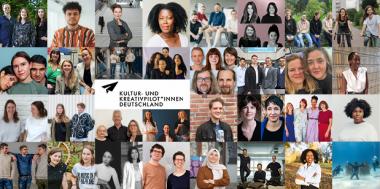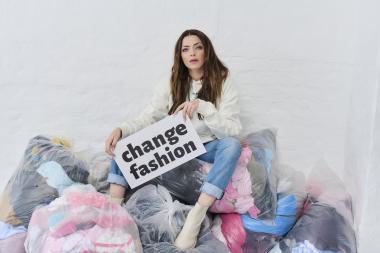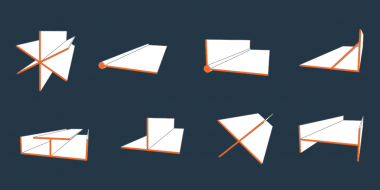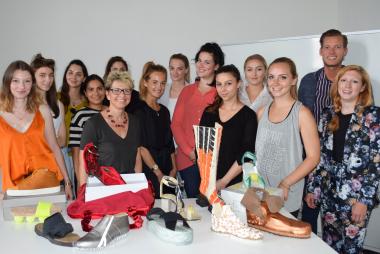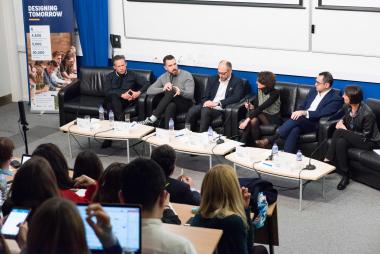Projekte mit Fokus Mode und Textilien als Kultur- und Kreativpilot*innen 2022 ausgezeichnet
Es sind Projekte mit Wirkung in Zeiten des Wandels – das verbindet die Titelträger*innen der Kultur- und Kreativpilot*innen miteinander. Jedes der 32 ausgezeichneten Projekte fokussiert sich darauf, Lösungen zu finden, die eine gesellschaftliche Transformation mit kreativer Kraft gestalten – und dabei unternehmerisch erfolgreich sind. Mit der Auszeichnung würdigt die Bundesregierung bereits zum dreizehnten Mal die innovativsten Unternehmer*innenpersönlichkeiten der Kultur- und Kreativwirtschaft in Deutschland.
Claudia Roth, Staatsministerin für Kultur und Medien, betont, dass für die vollständige Entfaltung des gesellschaftlichen und wirtschaftlichen Potenzials die Kultur- und Kreativwirtschaft in ihrer Arbeit unterstützt und ermutigt werden muss: „Die diesjährigen Titelträger*innen zeigen, dass die Branche gesellschaftliche Verantwortung in all ihren Facetten übernimmt und Lösungen für soziale Missstände bietet. Damit diesen zukunftsweisenden Ideen alle Türen offenstehen, müssen wir den kreativen Köpfen in Deutschland Rückenwind geben und sie auf ihrem unternehmerischen Weg begleiten.“
Trendanalyse 2022: Missionsorientierung der Kultur- und Kreativwirtschaft nimmt zu
Die Wirkungsorientierung der 32 Titelträger*innen ist Ausdruck eines Trends in der Kultur- und Kreativwirtschaft. Das zeigt die Auswertung der 700 Bewerbungen in diesem Jahr, die das inotiv-Netzwerk gemeinsam mit den Zukunftsforscher*innen von Third Wave durchgeführt hat. „Jede siebte Projekt-Einreichung formuliert eine präzise Mission, die immer auch eine klare Weltverbesserungsabsicht beinhaltet. Das jeweilig vorgestellte Projekt belegt die Mission faktisch und konkret. Ein solch ansteigender Verbreitungsgrad aktiver Zukunftsgestaltung kann doch nur Hoffnung stiften!“, sagt Zukunftsforscher Jonas Drechsel.
Die diesjährigen Titelträger*innen mit Fokus Mode und Textilien (alphabetische Auflistung)
Avenir Garment
Mit Avenir Garment will der gebürtige Tunesier Aladin Amiri die Zukunft der Mode mit kreativer Streetwear mitgestalten, sie mit sozialer und ökologischer Nachhaltigkeit paaren und Vorreiter einer Modeindustrie sein, die divers, kreativ und verantwortungsbewusst ist. Sein Ziel ist es, Ressourcen, Beratung und Unterstützung zu bieten, um die Visionen junger Kreativer umzusetzen. Ebenso im Fokus stehen die soziale Verantwortung für Produzent*innen in Tunesien, denen faire Löhne und hohe Arbeitsstandards geboten werden sowie die Möglichkeit für tunesische Kreative, ihre Botschaft nach Deutschland zu bringen. Zudem startet Avenir Garment ein Upcycling-Programm, in dem Künstler*innen aus nicht verkauften Textilien neue Produkte schaffen, die kreativ und einzigartig sind.
Fashion Africa Now
Fashion Africa Now ist ein digitaler Informationsraum und ein zukunftsorientiertes interdisziplinäres Netzwerk für Kreative aus Deutschland und Europa, der afrikanischen Diaspora und Afrika, das mit Stereotypen bricht, BIPoC-Perspektiven Raum gibt und neue Narrative erzählt. Das Team von Fashion Africa Now bringt Kreative, Experten*innen und Unternehmen zusammen und kreiert Ausstellungen, Workshops, Podcasts, Mode-Kooperationen, Veranstaltungen und ein Magazin, das sich auch gesellschaftspolitischen Themen widmet – mit der Vision einer aufklärenden, nachhaltigeren und inklusiven Zukunft in der Kreativ- und Modebranche. Fashion Africa Now schafft Sichtbarkeit für marginalisierte Kreativschaffende und repräsentiert die komplexe und vielfältige Welt des afrikanischen Modedesigns.
FEAT Boddies helpwear
„Ich fühl mich wohl in meiner Haut“: FEAT Boddies helpwear möchte funktionale und dabei optisch ansprechenden Textilien für alle Körper entwickeln, die ihre Träger*innen versteht und dabei sanft zu Haut und Körper ist. Das erste Produkt sind LUGGERS, hautfreundliche Oberschenkelbänder, die lästiges Aneinanderreiben vermeiden. Wichtig ist den Gründerinnen dabei, auf Materialien zu setzen, die die Umwelt schonen. Entsprechend verwenden sie nach Möglichkeit recycelte Materialien und lassen Luggers unter fairen Bedingungen in Europa herstellen.
FettFressHair
In deutschen Friseursalons fallen jährlich ca. 40.000 Kubikmeter Haarschnitt an – oder anders ausgedrückt: 222.222 Badewannen voller Haare. Ein Rohstoff, der weltweit ständig nachwächst und bisher im Restmüll landet, obwohl er eigentlich Gutes für die Umwelt tun könnte. Denn: Haare sind lipophil, lieben also Fett und fressen es förmlich auf. Somit eignen sie sich bestens, um Verunreinigungen im Wasser aufzunehmen. Das macht sich FettFressHair zunutze und baut aus dem anfallenden Haarschnitt innovative Schadstoffsammler in Form von Schlängeln, Matten und Vliesen. Auf diese Weise können sie Öle und andere Verunreinigungen aus allen Gewässern filtern. Die Erkenntnisse des Kieler Teams halfen beispielsweise schon den Einsatzkräften in Lima dabei, bei der Beseitigung der Ölkatastrophe im Januar 2022 effektiv zu reagieren. Über die Nutzung im Wasser hinaus prüft das Team stetig neue Einsatzgebiete. So wird aus Abfall Umweltschutz.
Re-Shirt
Was wäre, wenn man Textilien nur kurzfristig bedrucken könnte? Dann würde bei großen Veranstaltungen viel weniger Textilmüll entstehen und sehr viel Wasser gespart werden – 300 Liter für jedes nicht neu produziertem T-Shirt. Deswegen haben Emmy Schumacher und Anna Hadzelek Re-Shirt entwickelt, die erste temporäre Textildrucktechnik. Damit schlagen die beiden Gründerinnen die Brücke zwischen schnelllebigem Gestaltungsbedürfnis und Ressourcen schonendem Mindset.
Revoltech
LOVR – unter diesem Akronym („lederähnlich, ohne Plastik, vegan, reststoffbasiert“) hat Revoltech ein nachhaltiges Textil entwickelt, das aussieht wie Leder und sich auch so anfühlt. Es ist zudem verformbar und abriebfest sowie biologisch abbaubar und recyclingfähig. Das Beste: LOVR hat einen minimalen ökologischen Fußabdruck, da nur 0,3 Prozent der CO2-Emissionen im Vergleich zur Lederherstellung anfallen und auf Chemikalien und Kunststoffe verzichtet wird. Hergestellt wird die Alternative zum tierischen Produkt aus den Nebenprodukten des deutschen Hanfanbaus und pflanzlichen Zusatzstoffen.
Kultur- und Kreativpilot*innen Kultur- und Kreativbranche Fashion Mode Auszeichnung Nachhaltigkeit
u-institut für unternehmerisches Denken und Handeln e.V. │Kultur- und Kreativpiloten Deutschland


